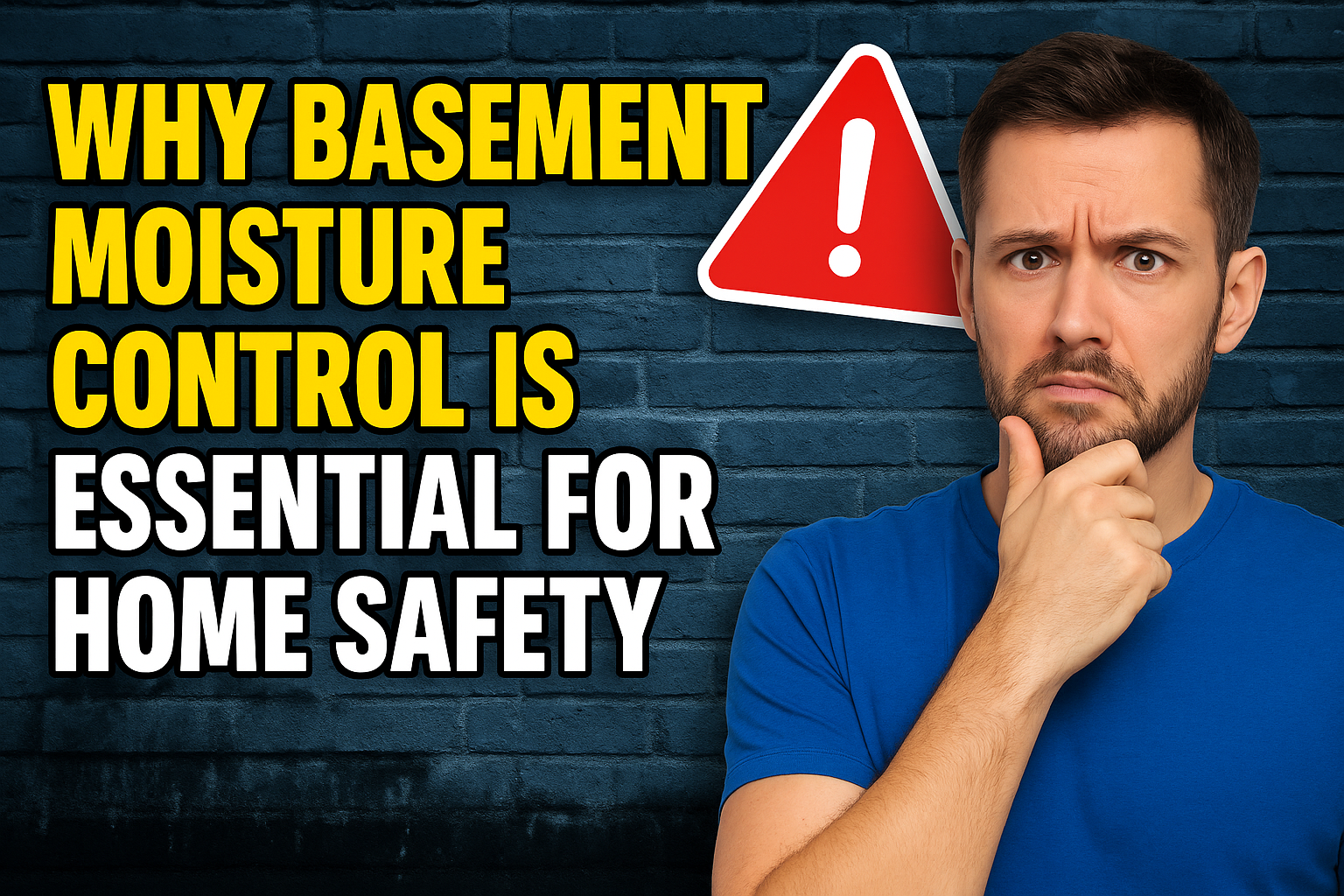As basements are generally concealed underground and are not in mind and sight until some issues turn up. The most common and serious problem for homeowners could be moisture. If left unnoticed, it can lead to severe structural damage. Besides that, it can ruin stored stuff and cause mold to grow which is also a health risk for you. Basement Moisture Control goes beyond the sense of comfort—it is a must-have element to ensure a safe and healthy living environment.
The Risks You Face: Why Moisture in the Basement Is Not a Joke
Having a damp basement is much worse than being just a minor inconvenience. It can spark serious consequences for you in the long term such as:
- Foundation Problems & Structural Damage: Moisture in your basement can make your foundation vulnerable and consequently cause paint peeling and crack in walls and floors.
- Mold and Mildew: Increased moisture leads to extensive growth of toxic mold which in turn impacts indoor air quality.
- Termite Infestations: Termite Infestation Signs are often found in damp spaces, which provide the perfect growth environment for insects and rodents.
- Electrical Hazards: Dampness in close proximity to wiring or appliances may lead to a short circuit which could also result in fire.
These are all clear indicators that moisture control for basement areas must be a top priority in every household.
Causes of Basement Moisture
Various factors cause moisture in the basement, and recognizing these factors is critical for effectively controlling that problem:
- Defective Drainage System Around the House: Misrouted or clogged gutters and drains cause the water to pool around the area around the foundation.
- Cracks in Walls or Floors: A crack as minor as hairline can easily permit groundwater to seep in the foundation, walls and floor.
- Poor Grading: The soil surrounding your house should be sloped downwards to prevent water accumulation.
- High Indoor Humidity: Daily household activities such as cooking and laundry can also add moisture to the air.
- Lack of Ventilation: Basements are usually deceived with insufficient airflow to take out excess humidity.
Once these sources are discovered, it becomes simpler to apply the most suitable Basement Moisture Control methods.
Signs Your Basement Has a Moisture Problem
Sometimes, the signs are pretty obvious. But sometimes they can be less conspicuous or evident, yet equally hazardous and damaging. If you have a basement in your house, always keep a keen eye on the following signs.
- Noticing a damp or musty smell.
- Noticing visible patches of mold on ceilings and walls.
- Having condensation on pipes and walls.
- Getting efflorescence (White chalky powder) on concrete walls.
- Bubbling wallpaper and peeling of paint.
- Unexpected water puddles or spots on the floor.
You can save thousands of dollars on repairs if you manage to notice these signs on the early stage, Additionally the security of your home will be assured.
Proven Solutions for Basement Moisture Control
Effective moisture control doesn’t mean a one-size-fits-all approach. Depending on your issue, consider:
1. Basement Waterproofing Greenville SC Services
For homeowners in the Southeast, including Greenville SC, waterproofing is a must due to high humidity and heavy rains. Professional waterproofing includes:
- Interior and exterior sealants.
- French drains.
- Sump pump installations.
- Vapor barriers.
Companies like Herren Pest Patrol provide comprehensive basement waterproofing Greenville SC solutions that prevent long-term moisture damage.
2. Improve Basement Ventilation
A lack of airflow can trap moisture. Install exhaust fans, or better yet, add ventilation systems to allow fresh air in and damp air out.
3. Use a Dehumidifier
A portable or whole-house dehumidifier helps maintain optimal humidity levels, especially during the summer. Keeping relative humidity below 50% discourages mold growth and keeps the air fresh.
4. Seal Cracks and Gaps
Inspect your basement walls and floors for any signs of cracking. Use epoxy or polyurethane injection methods to seal them and stop water infiltration.
5. Install Drainage Systems
Interior drainage systems collect and redirect water to a sump pump. These systems work beneath your basement floor and are highly effective.
6. Grade Landscaping Properly
To prevent the collection and subsequent seeping of water inside your house, the soil around your house needs to slope away from the foundation.
Core Benefits of Moisture Control for Basement Spaces
When you invest in moisture control, you’re not simply addressing a concern you’re enhancing the property’s market value and security:
- Better Air Quality: Means fewer allergens and polluted air.
- Gains in Property Value: Basements that are moisture-free are sought after by buyers.
- Lowers Your Energy Bills: Dry air is more accessible to heat and cool.
- Mental Peace: It protects you from future damage and expensive repairs.
A well-maintained and dry basement can be utilized for living as long as moisture issues are sorted.
Partnering with Herren Pest Patrol for Moisture and Pest Prevention
Moist basements often lead to pest problems. That’s where Herren Pest Patrol shines—they combine pest management with structural moisture control. By dealing with both, you protect your home from two threats at once. Whether you’re exploring basement waterproofing Greenville SC or need expert advice on pest deterrence, they’re a trusted choice.
Their services are also a great complement to Joist Repair for Crawl Spaces, ensuring every part of your home’s foundation stays strong and dry.
Frequently Asked Questions
Try using a dehumidifier, sealing the gaps, enhancing the ventilation, as well as ensuring the gutters and the downspouts move the water away from your house premises. If that doesn’t help, you might want to consider professional waterproofing services.
Definitely. Mold and mildew triggered by high humidity can cause respiratory problems and allergies, as well as other health problems—especially to kids and the elderly.
Strategically placing moisture-absorbing materials such as silica gel or calcium chloride, although effective, are only a temporary solution. However, a portable dehumidifier that is both affordable and efficient is the best and the most durable option.
Without a doubt. It helps prevent future damage, reduces health risks, and increases the property value. In places like Greenville SC, it’s practically indispensable because of the weather conditions.







